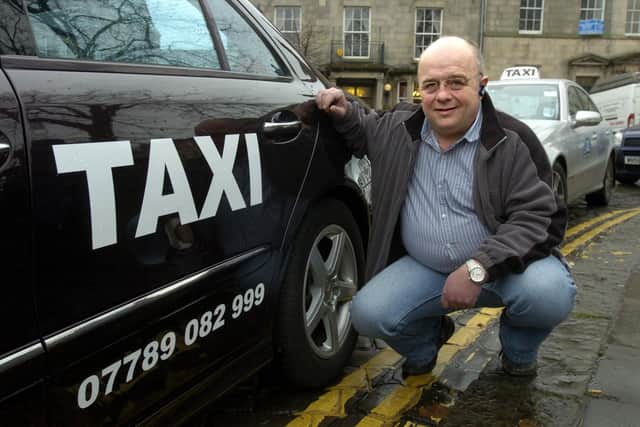Taxi drivers across Lancaster and Morecambe ‘need a rise in charges for a living income’
and live on Freeview channel 276
Although the hackney carriage taxi system is full of ‘Dickensian’ language from Victorian times, modern taxi drivers should not face Dickensian conditions, it was said.
Balancing the need for taxi drivers to earn a decent income against passengers’ needs for affordable transport and a backdrop of rising costs was highlighted during talks on potential tariff increases.
Advertisement
Hide AdAdvertisement
Hide AdCouncillors on the cabinet generally accepted that taxi charges need to rise. The difficulty is agreeing a method to set increases across a range of charges which are acceptable to drivers and passengers.


Local councils are responsible for setting hackney carriage taxi charges. At Lancaster City Council, most details are dealt with by the Licensing Committee. But final approval for any charge increases is taken by the cabinet.
At the latest cabinet meeting at Morecambe Town Hall, various options were discussed, including different charges calculated on times or distances travelled, and the potential impact on different types of passengers, from school children to old people, supermarket shoppers to people going to airports.
During a public questions session, taxi driver Andrew Kay said fuel costs, vehicle servicing, tyres, insurance and inflation costs had all risen faster than earnings and tariffs.
Advertisement
Hide AdAdvertisement
Hide AdHe said: ” I have been driving taxis since 1982, more or less. There was traditionally an arrangement to share income three ways between the driver, the vehicle running costs and the owner of the vehicle. In the past, once all this was accounted for, drivers could still make a living. Today, many drivers are relying on tax credits and other things to survive.
“I work less hours these days. But to make the level of income now that I earned when I first started driving, I would have to work day and night, six days a week.”
Green councillor Dave Brookes thanked Mr Kay for his comments. Commenting on the Dickensian language of the taxi system, with phrases like ‘hackney carriages’ and ‘yardage’, Coun Brookes added: “Drivers’ working conditions should not be Dickensian and it’s worrying that some drivers have to rely on tax credits.”
He said charges had to be agreed with the trade and a good review process was needed with meaningful consultations.
Advertisement
Hide AdAdvertisement
Hide AdA cabinet report stated there had been no fare review or rise in fares since 2019, when a 20p increase on ‘flag fall’ was approved. So a review all fares including flag fall, rolling charges, waiting times, soiling charges and booking fees was advised.
The city council’s Licensing Committee had recommended an ‘uplift’ to flag fall across three tariffs by 50p and a 10p rise to waiting charges. That way, the taxi trade would soon receive a rise proportionate to the current climate. However, the recommended increases were not supported by an agreed method with the taxi trade, the report added.
Coun Brookes said: “Consultation is important because it can save time in the long term and it should result in less objections. We need to ensure this happens. However the licensing committee is the democratic forum for consultation and the cabinet should respect that.”
Labour councillor Colin Hartley, who is chairman of the Licensing Committee, said a process was already in place for charges and consultation, which he thought was acceptable.
Advertisement
Hide AdAdvertisement
Hide AdHe added: “Income for drivers is important but we also have to bear in mind that many customers are on low or fixed incomes. It’s a tightrope that we walk down all the time. ”
However, Coun Brookes suggested the cabinet should not vote on the current recommendations from the Licensing Committee yet. Instead, he suggested some ‘swift, informal’ consultations be held with the taxi trade then the cabinet could look at final recommendations at a future meeting, probably in April.
This was agreed although some councillors asked if was realistic to expect a new method to be agreed in time for a cabinet meeting in the spring.
Labour councillor Erica Lewis asked if the council’s licensing staff team, which was quite small, had the capability to do more work. Coun Brookes said he had spoken to an officer and was told yes.
Advertisement
Hide AdAdvertisement
Hide AdCouncillors agreed that new arrangements should be agreed and confirmed as soon as possible, so taxi drivers would see the benefit.
Conservative councillor Andrew Gardiner, who is not on the cabinet, asked some questions and also said that taxi tariffs were essential for good driver and passenger health-and-safety. Drivers working long hours could be a danger as well as vehicles not being properly maintained because of rising costs.
In addition to costs, the Covid-19 pandemic has brought many challenges for the licensed taxi trade too, the meeting heard. Many drivers were not renewing their licenses and were seeking other work. So the city council was working with other organisations to support the taxi trade and encourage new applicants, through funding for training.